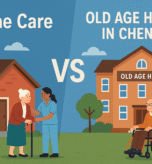Home care services refer to the care provided to seniors or individuals who need assistance with daily living activities at home. The goal of home care is to provide support, comfort, and independence to those who require it. The types of home care services available vary depending on the individual’s needs and preferences. In this blog, we will discuss the different types of home care services available to help you understand which type of care is suitable for you or your loved one.

The Different Types of Home Care Services
- Companion Care: Companion care is a type of home care that focuses on providing emotional support and social interaction to seniors. Companion care providers assist with daily living activities such as meal preparation, light housekeeping, transportation, and medication reminders. This type of care can be beneficial for seniors who live alone and need companionship and someone to talk to regularly.
- Personal Care: Personal care involves providing assistance with daily living activities such as bathing, grooming, dressing, and toileting. Personal care providers help seniors maintain their personal hygiene and independence. This type of care is suitable for seniors who need assistance with activities of daily living but do not require medical attention.
- Homemaker Services: Homemaker services involve providing assistance with household tasks such as laundry, cleaning, cooking, and grocery shopping. Homemaker services can be beneficial for seniors who need help with household tasks but can manage personal care independently.
- Skilled Nursing Care: Skilled nursing care involves providing medical care to individuals with chronic illnesses or disabilities. Skilled nursing care providers are licensed healthcare professionals who can provide medical treatments such as wound care, medication management, and physical therapy. This type of care is suitable for individuals who require medical attention and supervision.
- Hospice Care: Hospice care provides end-of-life care to individuals who have a terminal illness. Hospice care providers assist with managing pain and providing emotional support to individuals and their families. Hospice care can be provided at home or in a hospice care facility.
- Respite Care: Respite care involves providing short-term care to individuals who need a break from caregiving duties. Respite care providers can assist with daily living activities and provide emotional support to the individual. Respite care can be beneficial for caregivers who need a break from their caregiving duties.
- Live-in Care: Live-in care involves providing 24-hour care to seniors or individuals with disabilities. Live-in care providers assist with daily living activities, personal care, and household tasks. This type of care is suitable for individuals who need constant supervision and assistance.
- Specialized Care: Specialized care involves providing care to individuals with specific medical conditions such as Alzheimer’s disease or Parkinson’s disease. Specialized care providers are trained to provide care that is tailored to the individual’s medical condition. This type of care is suitable for individuals with complex medical needs.
In conclusion, home care services provide a range of options to seniors or individuals who need assistance with daily living activities. The type of home care service that is suitable for you or your loved one depends on your individual needs and preferences. It is important to consider your current health condition, level of independence, and the type of care you require when choosing a home care service provider. Consult with a healthcare professional to determine which type of home care service is best for you or your loved one.





